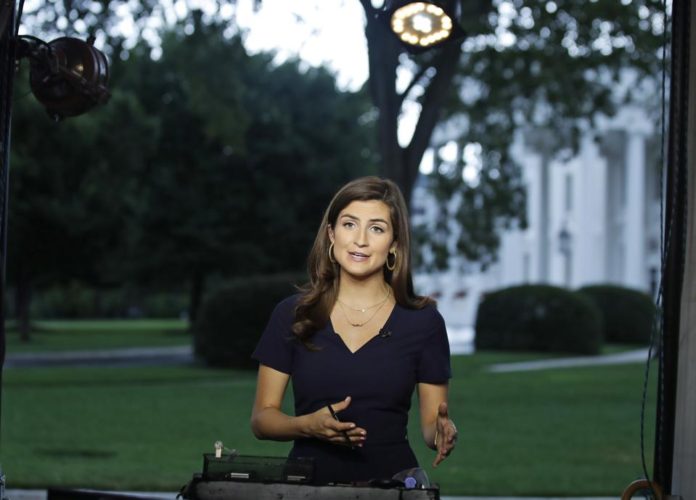
CNN chief White House correspondent Kaitlan Collins is shown reporting live from the White House.
We’re only into the second quarter of 2021, and it’s already pretty clear that the news business — as well as what can broadly be defined as the larger media ecosystem — continues to be defined by a state of turbulence nearly equivalent to that which defined 2020.
The coronavirus and the marginalization of Trump (for now) remain hugely consequential journalistic forces to watch. Tech giants like Facebook and Netflix
To stay informed on these and other media narratives like them, the following is a list of some of the most important people who operate both in and around media and who drive specific media narratives. This list is completely subjective, and it could certainly be an order of magnitude longer than what I’ve laid out below, but it encompasses some professional journalists (with a few exceptions, which we’ll come to) across sectors that range from politics to technology, cybersecurity, entertainment and more. Meet some of the people who will shape, share, write, broadcast, and define a broad swath of the news and related content that we consume this year, starting with CNN’s new chief White House correspondent.
This being the first year of a new presidential administration, one tasked with ramping up a vaccine program to fight the coronavirus pandemic and dealing with countless pre-existing challenges left over from the prior administration, the political news front has been and will remain a busy one and that sends a relentless barrage of alerts, updates, and breaking news at readers and viewers pretty much 24/7. CNN’s Kaitlan Collins is on this list for many reasons, among them the fact that she was promoted to White House correspondent for the network in January. She’s unflappable, with that even-keeled demeanor you want in a broadcast journalist, relentless while also never inserting herself into the story, and she’s an absolute beast when it comes to breaking news. If you paid attention to little else over the course of the day with the exception of Kaitlan’s Twitter feed, you’d still have a pretty comprehensive grasp on the Biden administration, Congress, the US response to the coronavirus pandemic and so many more of the day’s key headlines.
MORE FOR YOU
Ben Smith, The New York Times (@benyt)
Before he died in 2015, I regularly awaited David Carr’s Monday column in each week’s New York Times, often catching his Media Equation when it went online late on Sunday evenings. If you love media and newspapers and happen to go through life with an affinity for the Fourth Estate, David was a cartographer of sorts, attempting to map out the New World of our profession with a novelist’s command of prose and a scrappy reporter’s lust for a good story. It made his column unmissable, and led many to conclude his shoes would be near-impossible to fill. Since January 2020, though, Ben Smith has done just that. His columns are provocative, but not for provocations’ sake. They’re often sprinkled with micro-scoops throughout, like the anecdote he reported in one particular column about Apple’s Netflix-like TV service, in which he revealed that Apple CEO Tim Cook killed an in-development Apple TV+ show about Gawker as soon as he found out about it. Or the scooplets in Smith’s recent piece about Substack, noting that the online publishing platform was dangling six-figure advances to try and lure away top NYT talent like culture and technology reporter Taylor Lorenz. Basically, Ben is a must-read if you have any interest whatsoever in media of almost any kind.
Bela Bejaria, Netflix
Before joining Netflix to head up Global TV a few years ago, Bela Bejaria’s career spanned traditional entertainment giants like CBS
Tim Cook/Daniel Ek (Apple vs. Spotify podcasts)
I’m going to cheat a little bit and put two technology industry chief executives here, for a reason that extends to media. Apple CEO Tim Cook and Spotify CEO Daniel Ek are about to go to war over podcasts, with the latter streaming giant set to unveil a new podcast subscription paradigm this week. Podcasts are an increasing source of interest for Spotify, which has looked at the possibility of launching a podcasts-only offering and which, this week, will reportedly announce subscription options for podcast creators that let users pay for things like bonus and/or exclusive content, ad-free access and early listening. One thing Spotify reportedly won’t be doing is siphoning off a percentage of the revenue that podcast creators make, in contrast to Apple.
During Apple’s “Spring Loaded” event last week, the iPhone maker unveiled Apple Podcasts Subscriptions. “Starting in May,” according to Apple, “listeners in more than 170 countries and regions can sign up for premium subscriptions that include a variety of benefits curated by creators, such as ad-free listening, access to additional content, and early or exclusive access to new series.” However, podcast creators will pay a $19.99 fee to Apple for the privilege of being able to offer subscriptions, and they will also give Apple 30% of their subscription revenue in year one, followed by 15% annually thereafter. Needless to say, though, major news brands are already working with Apple on the imminent in-app podcast subscriptions, including NPR and The Los Angeles Times.
Nicole Perlroth, The New York Times (@Nicoleperlroth)
I’m not sure how Nicole Perlroth, who covers cybersecurity and digital espionage for The New York Times, sleeps at night. She is regularly face-to-face, in a manner of speaking, with a dark side of the world that most people will never encounter — which is to say, she is a fantastic and must-read reporter at the intersection of all things cybersecurity, hacking, politics and the global cyber arms race. I always love a great title, and her book about these topics that was published in February 2021 has a particularly memorable one, culled from the sinister things that her hacker sources have told her over the years: “This Is How They Tell Me The World Ends.” In her stint covering this beat for the Times, she’s covered Russian, North Korean, Iranian, and Chinese cyberattacks, including, as she explains in her book, once embedding herself with her own newspaper’s IT security team “as the Chinese hacker we came to refer to as ‘the summer intern’ popped up on our networks each morning at 10 a.m. Beijing time and rolled out by 5 p.m. in search of our sources.” All the while, she continued, she “clung desperately” to the idea that she could live a normal life. Her life isn’t normal, though, and neither is her reporting (it’s extraordinary).
Mark Gurman, Bloomberg (@markgurman)
Speaking of reporting around technology, Bloomberg’s Mark Gurman is a scoop machine when it comes to technology news and specifically Apple. He is a must-read reporter for first dibs on everything from new iPhones and iPads and their feature sets to news and updates around Apple’s iOS mobile operating software and so much more. Like just a few days ago — with pretty much the entirety of tech journalism waiting for Apple to drop iOS 14.5 because of the challenge to Facebook’s business model therein, Gurman recently published news on what’s next. iOS 15, with his reporting showing that Apple also plans to revamp the iPad home screen and plans to beef up iMessage into more of a Facebook-like competitor. If you care about technology news and you’re not following Gurman’s work or his social media presence, you are absolutely doing it wrong.
Chris Best, Substack (@cjgbest)
Substack CEO Chris Best and the rest of the team behind the online publishing platform are absolutely hastening a sea change in the way content is consumed and how creators get compensated. The email newsletter businesses that Substack is helping journalists build feels revolutionary, because the journalists/creators themselves can now be their own bosses, theoretically have no upper bound on their salary potential, and don’t have to chase clicks or fight to get a particular story on the front page or on a website. High-profile journalists like Casey Newton, formerly of The Verge, launched his own tech industry-focused Substack newsletter called Platformer, and other examples include Substack newsletters from Matt Yglesias, Roxanne Gay, and Lauren Wolfe. I particularly love spy novels and thrillers relating to any kind of espionage, so one of my favorite Substacks that I’m paying for is Jeff Stein’s SpyTalk, which includes contributors from across the intelligence community and is perfect for readers like me — it includes reviews of books and pop culture related to the genre, deep dives into fascinating spy stories from history, and reported pieces that no one else is really touching because it’s not like “spying” is a dedicated beat at most mainstream publications. All of which is to say, there’s definitely something happening here.








